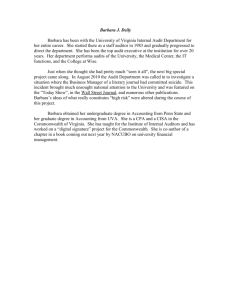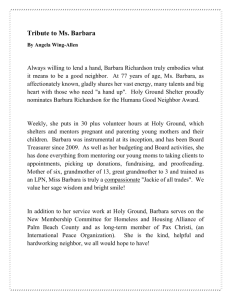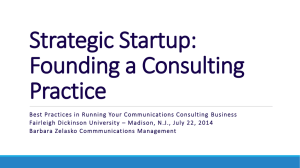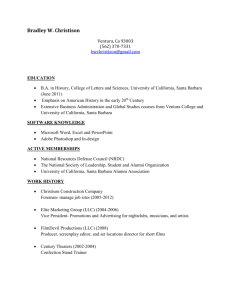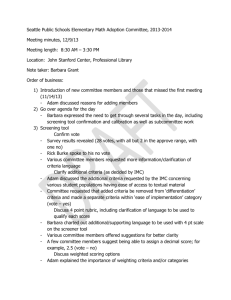SIM Subcommittee Minutes and Report June
advertisement
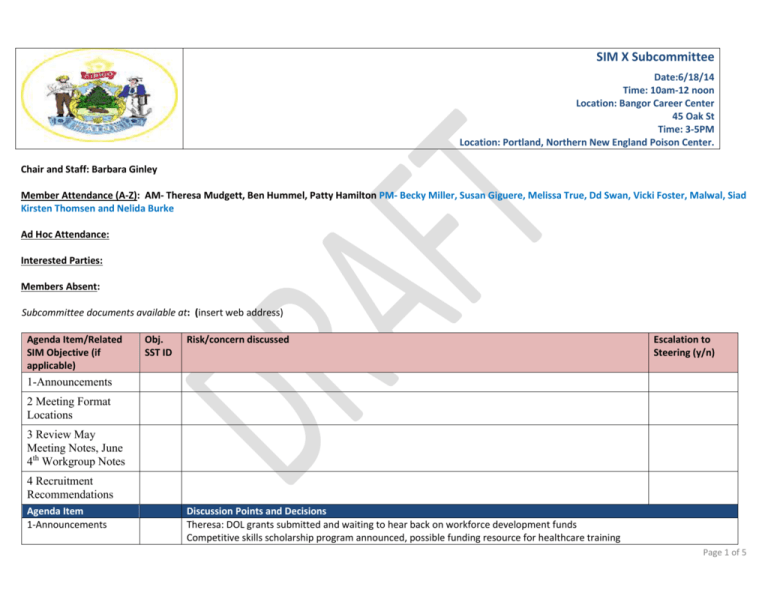
SIM X Subcommittee Date:6/18/14 Time: 10am-12 noon Location: Bangor Career Center 45 Oak St Time: 3-5PM Location: Portland, Northern New England Poison Center. Chair and Staff: Barbara Ginley Member Attendance (A-Z): AM- Theresa Mudgett, Ben Hummel, Patty Hamilton PM- Becky Miller, Susan Giguere, Melissa True, Dd Swan, Vicki Foster, Malwal, Siad Kirsten Thomsen and Nelida Burke Ad Hoc Attendance: Interested Parties: Members Absent: Subcommittee documents available at: (insert web address) Agenda Item/Related SIM Objective (if applicable) Obj. SST ID Risk/concern discussed Escalation to Steering (y/n) 1-Announcements 2 Meeting Format Locations 3 Review May Meeting Notes, June 4th Workgroup Notes 4 Recruitment Recommendations Agenda Item 1-Announcements Discussion Points and Decisions Theresa: DOL grants submitted and waiting to hear back on workforce development funds Competitive skills scholarship program announced, possible funding resource for healthcare training Page 1 of 5 Can find the skilled workers scholarship application on the Maine career center website: http://www.mainecareercenter.com/services-programs/training/cssp/index.shtml Short window in which you can apply, only accept physical copies You can apply through any career center Lottery for applications, once you win a slot then you are put on a wait list Assessment to make sure person can take college courses Interest in southern part of the state among the CHOWs Foreign trained physicians that may need to go back to school in hopes of becoming clinician in US Barbara: Western Mass AHEC will possibly deliver core competency training for CHWs this fall Shared with them core competency skill grid, core roles and definition from group meetings Training available to those candidates funded under pilot project but also additional slots Barbara: Joint presentation with CHW researcher from Lewiston at Minority Health Conference Most of the presentation focused on the work of this group 2 Meeting Format Locations Barbara: Work plan for year two of the project: solidify training; identify standard curriculum and training resources; no authorizing body currently but group must consider possibility legislation; support pilot projects Barbara: Issues during the last monthly meeting with connecting to participants by phone Also low turnout for the meeting at Maine General in Augusta Are Fairfield and Waterville suitable locations for statewide meeting? Just stick to regional meetings? Theresa: The driving difference between Waterville/Fairfield and Augusta is not significant Barbara: Let’s give statewide meeting one more try in September During the July phone meeting we will look at sample job descriptions on adobe, heavy on info sharing Documents should be looked over ahead of time by participants Theresa: Winter months 3-5 meeting difficult because of travel Barbara: December meeting also very close to the holidays, perhaps this should be a phone meeting Could make sense to flip December and November format, 2-4 meeting time instead Hard to know where the pilot sites will be located and what would be best for their participation Originally the meetings were schedules from 3-5 with the hopes that community members could participate, but that has not really panned out (PM Meeting) Remote participation enables some members to participate, making it available for the monthly meeting regardless of location is essential. Understand that participation and input is important but balancing work with meeting time can be a struggle for CHWs. Dd noted that this dynamic has been an in issue for the CHW Inter-exchange where participation is key to shared learning so attendance affects effectiveness of time but 2 hrs. /month has been hard for some. Page 2 of 5 3 Review May Meeting Notes, June 4th Workgroup Notes Barbara: Work group meeting was held at the beginning of June because we did not get much accomplished in May, summarizes the notes from the work group on recruitment and training Barbara: Shared experience of EBCBOs in Lewiston, when proficiency testing gets done by phone, sometimes friends or family members will help candidate, what are other tools? Theresa: TOEFL English proficiency screening for college. Possibly sets the bar too high. Barbara: CHAs at MMHP just trained in Spanish, because they are not required to do interpretations and uses Migrant Health Promotion funding to develop curriculums for CHWs Patty: shared an empathy screening tool- http://www.midss.org/content/toronto-empathy-questionnaire Barbara: Are there additional recommendations on attributes as it relates training? Barbara: Candidates should have knowledge of community resources already when they start a position Theresa: Ability to collaborate under the interpersonal skills or capacity/coalition building Barbara: “Flexible, empathetic, interested variety work situations, committed empowerment through education” MHP attributes (PM Meeting) Recruitment recommendations will need to balance the individual attributes with the needs of the organization that is hiring the CHW. In terms of language additions to the “Attributes of CHWs” there was interest in seeing more specific language focused on the ability to collaborate and network. Phrases proposed included “linkers” or “network weavers.” 4 Recruitment Recommendations Language (English) Proficiency: PM group (3 CHWs present) recognized that healthcare demands a high level of proficiency to effectively communicate with both patients and clinicians, and the level of proficiency only increases if CHW is going to be expected to act as an interpreter. Recommended that in order to establish proficiency the following be considereddocumentation of proficiency through medical interpreter process/certification, providing language certificates and/or diplomas from high school and/or college, determine what CC system requires (i.e. seen as one level below TOEFFEL). Barbara: Entities that should be called upon to help with recruitment? Barbara: Short listing in the ICER document includes AHECs, MMHP, and Portland Public Health But also need Head Start and CAPs Patty: Food and Medicine Eastern Maine Community College training for parents about job hunting and parenting Community Partnership for Protecting Children (WINGS) in Bangor and Portland, community members working on neighborhood improvement with DHHS protective worker, not part of Maine Families Barbara: We should ask WINGS now they have done community engagement? Theresa: United Way asset building training Patient Advisory Committees at FQHCs and the Hospitals Barbara: Career Centers Public Housing Departments in Portland, Lewiston, and Bangor have a community liaison or office where they conduct after school programs or adult education PM Meeting) Recommended the following to be added to the ICER list- Peers, MIRC list serve, Opportunity Alliance, CAPs/PROP, WIC, faith based organizations, small businesses including- Laundromats, auto shops, markets, etc. Page 3 of 5 Barbara: For the sample job description looking to cast a wide net. Ask everyone to send them? We can also look at those from MHP and CHW Associations in other states Tribal Communities use set description from Indian Health Services Looking to do a resources file with 7 samples Barbara: Will collect curriculums that people believe will meet the competencies and do a slide deck. Connecting with people in other states to see their process for developing curriculum and competencies Barbara: Could prior life, work, and educational experience that count as equivalency for CHW training? Theresa: Career Pathway could incorporate an assortment of different backgrounds Education or job in nursing, CNA, case manager, liberal arts Equivalency for knowledge or skills around disease processes or case management for example Barbara: A requirement of a 4 year degree could risk excluding people who otherwise have a strong skill set Conversation at MMHP about CHOWs at MMHP meet the competencies but not community members Shared life experience and or understanding, versus strictly shared culture or language. Ben: Meeting the nuanced needs of all adults learners with very different backgrounds requires different levels of support Barbara: At AHEC, trainer in the room that observers how participants are doing in the training and then one on one follow up on the areas in which the individual is struggling. Barbara: For candidates that may be grandfather in, can we identify what sorts of work they have done and for how long? Theresa: Community College System and University portfolio assessment bring forth documents for review DOL Apprenticeship Program: employee takes education courses at local college 50% tuition paid by program then other 50% paid by the employer or individual 2 year degree at the end, increased wage, on job experience previous course work can count Historically used in the trades but Maine General and Hospitals exploring this option Barbara There is an absence of large employers participating in stakeholder group. In other states employers with a need for CHWs helped drive the process: public health departments, hospitals, and CBOs. Pilots will hopefully bring it into the consciousness of larger employers, but what do they need? h: Has talked to the Mayo Regional Clinic about CHWs Their employment needs are centered on nursing and home based care, community para-medicine CHWs possibly part of the solution in filling in these roles at major hospitals Theresa: EMTs work with people around falls and staying at home but means that hospitals/EMTs are losing reimbursement for ambulance or medical services (PM Meeting) Equivalency/Experience discussion focused on the recognition/acceptance that it is a combination of skills/knowledge/experience and education that should be looked at when recruiting a CHW. Previous experience and/or knowledge of the CHW model, as a connector or navigator (in one’s community or from personal experience) ability to Page 4 of 5 understand the “big picture” within the community are all key. There should also be recognition of any international certificates and/or experience as a CHW. Often there may be transferrable skills that are not from paid employment (i.e. a Mom who has been out of the workforce, but has had significant experience navigating the healthcare system on behalf of her family). There also needs to be an acknowledgement of potential of certain candidates who with training and skill building may success as CHWs. Our efforts need to support the growth of CHWs, CHOWs as a stepping stone to better employment. Maine General’s workforce has varying levels of required education/experience: health educators all have a bachelor’s degree in HE and are CHES certified, public health specialists hold master’s degrees and peer supports are all selected because of shared disease status/diagnosis. Public Comment New Actions Agenda Item Action Items Status Who Due By Determine what test/assessment community college system uses to determine English proficiency BG July mtg Get copy of Immigrant Resource List to add to listings of CBOs that could be useful to recruiting a CHW. Nelida or Bankole July Mtg Who Due By 4. 4. Outstanding Actions Reference Action Items Status Page 5 of 5
